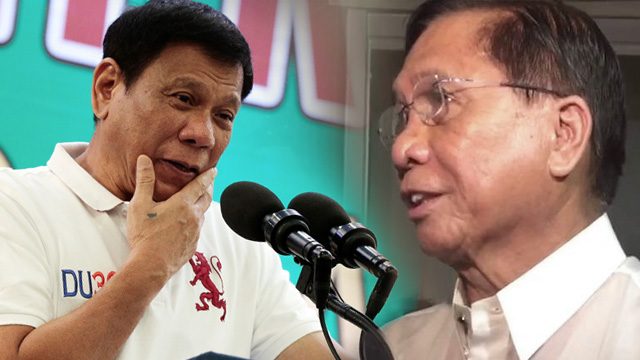SUMMARY
This is AI generated summarization, which may have errors. For context, always refer to the full article.

MANILA, Philippines – A comprehensive peace roadmap has been approved by President Rodrigo Duterte, the Office of the Presidential Adviser on the Peace Process (OPAPP) announced on Tuesday, July 19.
In a statement, peace adviser Jesus Dureza said that Duterte “approved in its entirety” the formula for peace he presented during a closed meeting on Monday, July 18.
The roadmap aims to provide peace and development by addressing the issue on the Bangsamoro and resumption of peace talks with the Communist Party of the Philippines-New People’s Army-National Democratic Front (CPP-NPA-NDF).
The 17th Congress, he added, will pass a law to enable the peace road map of the new administration.
Duterte also gave the go signal on Dureza’s proposal of aiming for a massive on-ground development together with implementing the agreements entered into with rebel groups. This can be achieved through enabling OPAPP to implement and oversee developmental projects related to peace.
“I can sign a hundred peace agreements but if those on the ground do not immediately feel the dividends of peace, those agreements will not be sustainable,” Dureza emphasized.
Years of conflict specifically hindered development in the ARMM, leaving huge parts in poverty. As of the first half of 2015, ARMM registered a poverty incidence of 59% or at least 6% higher than 2012’s 52.9%.
‘Implementation stage’
While peace talks with the CPP-NPA-NDF are set to resume on August 20 to 27, negotiations with the Moro Islamic Liberation Front (MILF) are defined to be “over.”
The government, OPAPP said, will focus on the implementation of the agreements with the MILF. (READ: Dureza vows to honor agreements with MILF)
However, instead on the proposed Bangsamoro Basic Law (BBL), the road map now requires that “an all-Moro body will be tasked to draft anew a more inclusive proposed enabling law.”
The BBL, was based on the Comprehensive Agreement on the Bangsamoro (CAB) which outlined mechanisms for peace in the Autonomous Region in Muslim Mindanao.
Signed in 2014, the agreement was the outcome of 17 years of negotiations with the Philippine government and the MILF. The proposed bill’s passage, however, was halted notably after the Mamasapano clash in January 2015. (READ: The Bangsamoro peace deal at a glance)
Work on the new law that will replace the BBL, according to OPAPP, “will be done simultaneous with the moves to shift to a federal set-up.”
The Bangsamoro Transition Committee (BTC) will also be mandated to propose amendments to the 1987 Philippine Constitution over matters in relation with their region.
ARMM Governor Mujiv Hataman on Wednesday, July 20, lauded the “sense of urgency” of the Duterte administration. He called that the promise of “continuity” regarding the agreements with the MILF “a step forward in the right direction.”
Deciding to coincide the work on the new proposed law with actions toward federalism, he added, is an acknowledgement that the “shift will take time relative to pursuing a legislation affirming the gains of a peace process that has been in motion for more than a decade.” – Rappler.com
Add a comment
How does this make you feel?
There are no comments yet. Add your comment to start the conversation.